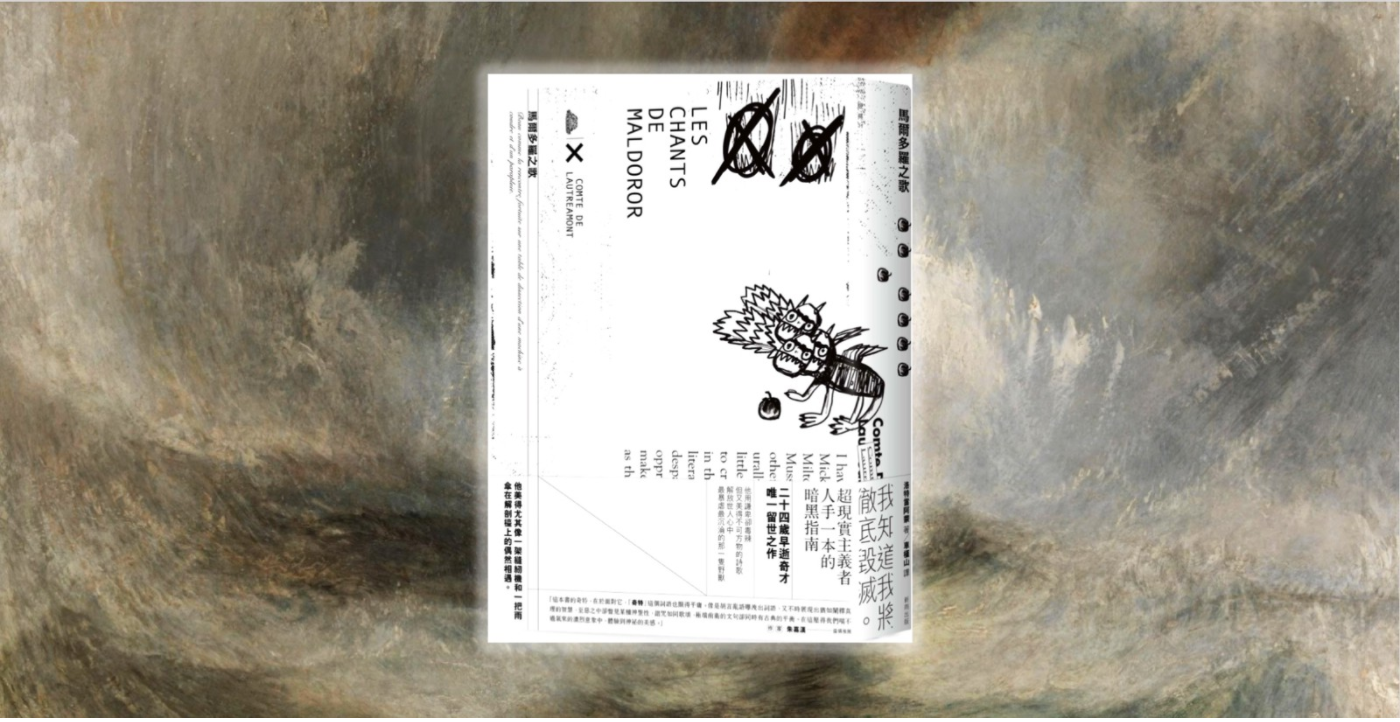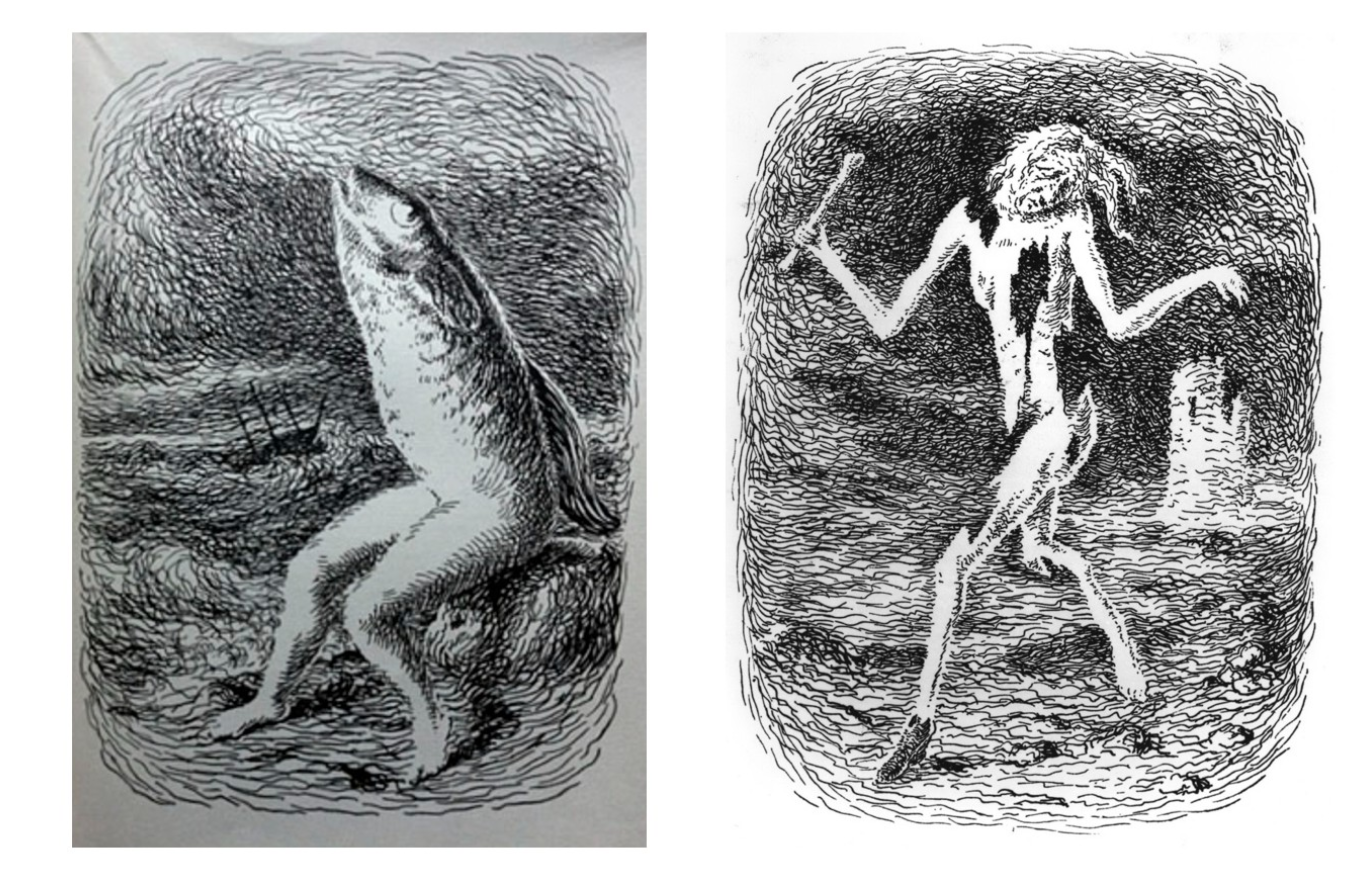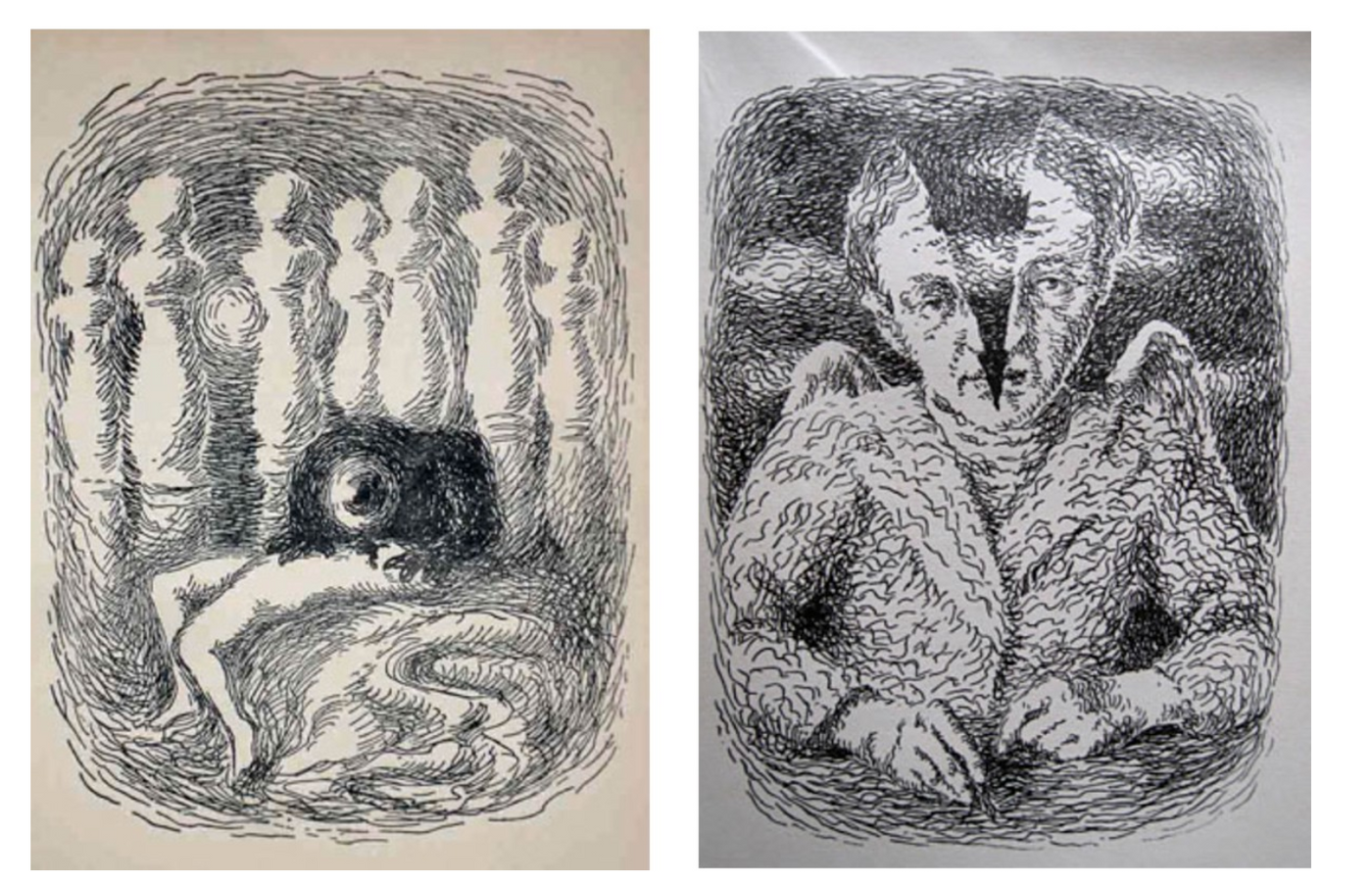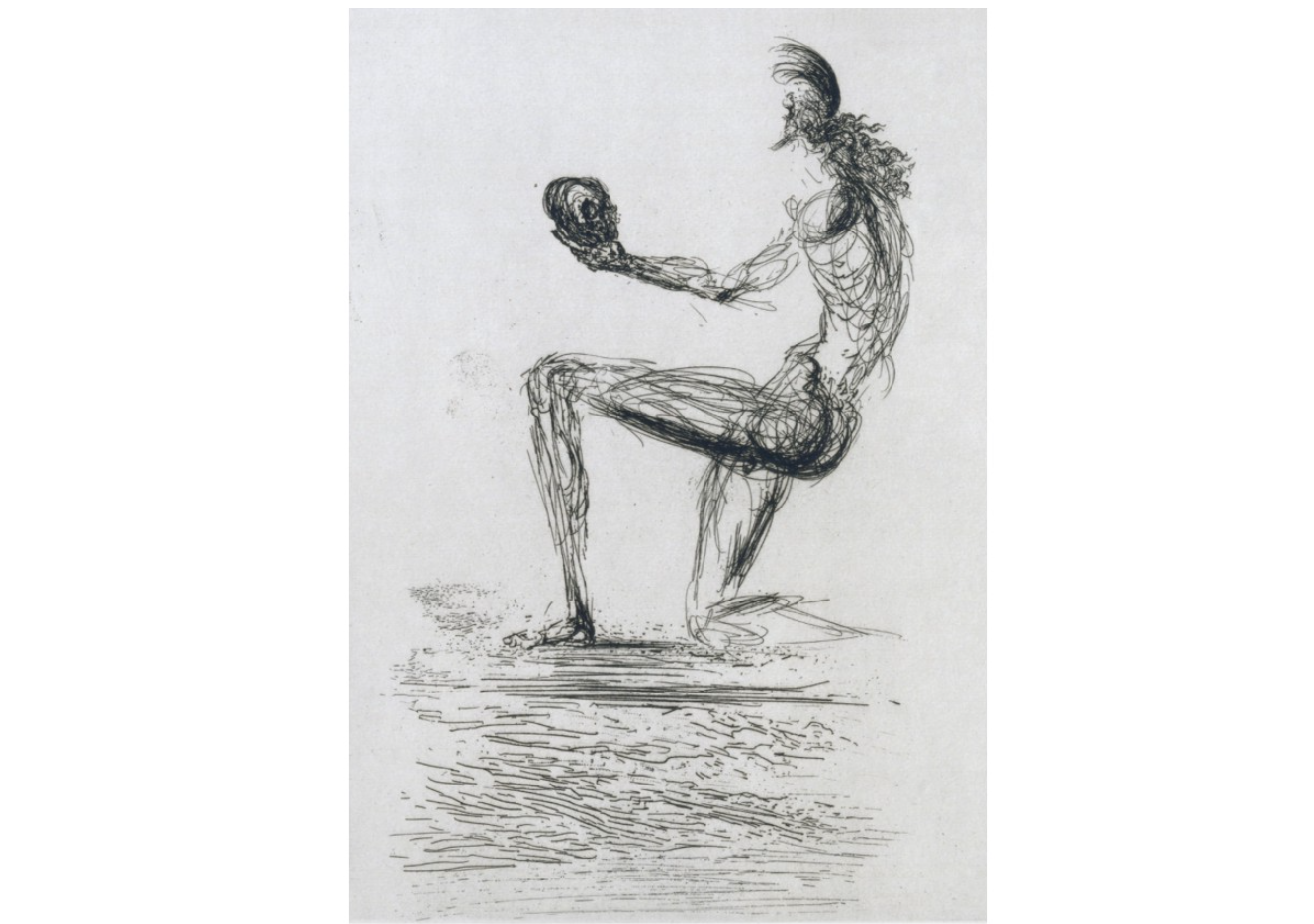Lautreamon's "Song of Maldorro": do not enter the world of reading peacefully
Thanks to Weibo for publishing this article
Link: https://paratext.hk/?p=3684
We always think that people know the world through language, which helps us name the things around us, allows us to be familiar with and talk about "them", further generate analysis, understanding, and finally produce all kinds of knowledge, and continue these knowledge in words, To enable future generations to continue to study things that have not yet been named and understood. As the words "idea" and "view" show, language wants to act as a vision that brings light, so that things can project their form into the heart of man and be illuminated. "Meaning" becomes light, dispelling the uncertainty they originally brought. At the same time, "concept" becomes the horizon of language, expanding the visibility of things to us.
But language is also like a second vision produced by people in order to get rid of light, a sense to imagine alone in darkness and in absence. In language, as long as the description is accurate, delicate, or the concept is clear, people don't necessarily need to actually see something, but they can also "see" something they haven't seen before. This "vision" can even grasp oneself better than real vision. "see" things. To a certain extent, in the repeated description, the text has turned itself into a laboratory of internal light and vision, immersed in the presentation stimulated by the densely populated optic nerves and synapses constructed by the text, trying to use language redeployment, "seeing" what one cannot see. It seems that the use of language is ultimately to develop and reconstruct the vision of "self".
"The swimmer and the female shark he rescued were face to face and looked at each other for a few minutes, each amazed to find so much ferocity in the other's gaze...with mutual admiration, with deep Respect, holding their breath underwater, swimming towards each other together, both wanting to gaze at their own living portrait for the first time... Sensuality follows this expression of friendship. Two powerful thighs are as tight as two leeches Clinging tightly to the monster's sticky skin, arms and fins intertwine on loved ones, and their throats and chests quickly become a blue, seaweed-smelling mass. In the continuing rampant storm, under the light of lightning, on the wedding bed made of bubbling waves, swept away by a cradle-like undersea current, tumbling and sinking into the depths of the unknowable abyss, in a long, chaste, Terrible mating together!...Finally, I found someone who is similar to me!...I am no longer alone in my life!...She has the same mind as me!...I face me first love!"
In "Song of Maldorro", language is completely transformed into a metaphorical dance. His sentences may be too long and full of bizarre plots, making it difficult to see at a glance, but the emotions expressed in them are quite direct, like some kind of expression. The music, which is very dynamic and pictorial, cuts through our idle eyes and mediocre vision like lightning. In this, all the words are like a kind of novel image, which brings us the wonders of stirring our hearts. Not only does he allow us to "see" many things that we could not see before, but he even reinvents the way language is used to "see" things. In these words, the original "meaning" of the words was erased one by one, and the "meaning" was no longer his own meaning, but just an image of himself. "Sharks" are not sharks, "oceans" are no longer oceans, "storms", "lightnings", etc. are no longer themselves, but become metaphors and symbols of emotions, feelings and thoughts.

Perhaps the more radical point is that, in such writing, language is no longer a gaze for understanding the world, but to completely liberate people from their own vision, producing a gaze that does not seem to happen for viewing. This "eye" is not for seeing what we can see, but for "seeing" what we can't see, or even don't exist in this world. At the same time, language no longer refers to its counterpart in the world, but instead turns the original referents into symbols and impressions for understanding oneself.
Is it the language that keeps describing the world? Or is the shadow of the "world" constantly describing our language?
However, if you want to say what it was like to read The Song of Maldorro for the first time, it felt like a visually distressed voyage, full of moments of loss, dizziness, confusion, because having " Comte de Lautréamont, known as the "Poetry Terrorist", writes words that are peculiar, ingenious and admirable, and cannot help but be overwhelmed by their charm, but they are not written to please the reader at all. . On the contrary, they are as if the author is trying to prevent people from reading himself, and the carefully constructed reefs and the conjured whirlpools and waves roar and scare readers dangerously, asking them not to reach the end of the poem peacefully.
Although surrealists used to be hailed as a "bible" for everyone, or a "dark guide" that everyone loved to read, "Song of Maldorro" is a prose poem that is not easy to read. The article describes the journey of the protagonist Maldorro in pursuit of his own poetry, but in fact its theme is not so clear, mixed with many other themes, such as good and evil, the pain of creation, spiritual and physical death and so on. Narratively, he is not linear, but very jagged and complex. It is like a huge cobweb woven by many thin threads of unknown meaning, which stick to the countless readers who are slowly moving along the text with countless confusions.
"But...what's the matter with my fingers? I just started working and my joints are paralyzed. However, I need to write...it's impossible! Well, I repeat that I need to write down my thoughts: I have the same Authority obeys this law of nature... But no! No! The quill still doesn't move!..."
"Where did Maldorro's first song go? Since he stuffed his mouth with belladonna leaves, walked through the kingdom of rage, and let it escape in a moment of contemplation? ... We don't Great clarity. It is neither the tree nor the wind that guards it. Morality passes here, and unexpectedly finds in these fiery pages a strong protector, and sees him walking with firm, upright steps to the dark corners and secret fibers of consciousness Medium. Science is at least certain that from then on the toad-faced man no longer knew himself, and often fell into frantic bouts, resembling a forest beast. It wasn't his fault. He curled up under the timid mignonette Eyelid, he always thought that he was only made of good, and the amount of evil was very small. Suddenly, I exposed his heart and conspiracy to the sun, and told him that on the contrary, he was composed of only evil, and the amount of good was very small..."
There are many passages in "Song of Maldorro" that the reader may not know how to react when they first read it, because we are not quite sure what the author's focus is. Looking at the past, I only felt that the six poems were filled with discourses from different perspectives, as well as descriptions of different styles. For a while, it is like poetry, expressing special scenes and images with different words, and for a while, it may describe the dialogues of characters like dramas and novels. Sometimes these dialogues may not be like dialogues halfway through, because they will begin to describe and dialogue. Irrelevant scenes and thoughts, even talking about the words that the characters in another scene started talking about. It seems that he has a lot of words to say, but they are full of conflicts with each other, so that the final words seem to be covered by multiple layers of words, losing the object of his dialogue and even the goal of writing. Why even write? Why speak? Like the anxiety inherent in the book, the broken words scattered throughout the six poems become images that are drifting and difficult to decipher.

In fact, even the author may not be sure of his own writing, what is the end that he wants to pursue and reach in the end. The six poems are filled with all kinds of bewildered questions and answers, and in the end, what writing brings is not a beautiful completion, not an ideal end, but all kinds of self-destruction, making the protagonists in the poems fall into evil and degenerate step by step. In thoughts and behaviors, the whole body is like a terrible disease, allowing desire and various impulses to control, burn itself, and finally die a passionate death.
What is the relationship between destruction and creation? It is a theme that "Song of Maldorro" keeps touching, and to some extent, this theme corresponds to the discussion of good and evil in the text, and also corresponds to the text's rebellious thoughts on the Creator and God. To a certain extent, "Song of Maldorro" has the shadow of Baudelaire's "The Flower of Evil" or even Sade's "120 Days of Sodom", full of praise for evil and cruelty, but also full of He slandered and criticized the belief in God and the Creator, and then wrote about his disgust for society and crowds.
A kind of disgust and hatred runs through the center of the whole poem, aiming at the various orders that control people and society. However, on the other hand, the whole poem is also filled with a strong sense of despair and tragedy. Because even the protagonist finds it difficult for him to break free from the control and influence of these orders. In a certain poem, he likened his soul to being locked in a scabbard called "body", as if no matter how sharply his inner thoughts and words stabbed him, the will could not pull it out of himself, only To endure this pain for the rest of my life.
"Yes, I feel my soul locked in the scabbard of my body, unable to escape from the crowded shore, so as not to witness the show of lead-colored hounds of disaster--they walk through the swamps of massacres and the abyss relentlessly pursue those humanoid antelopes. But I don't complain. I accept life as a wound, and I will not allow suicide to heal wounds. I hope the Creator gazes upon this opening in every moment of his eternity The crack. This is my punishment for him."
Since ancient times, people have always praised "creation" and believed that creation is a beautiful thing. But Lautreamon's "creation" actually contains a kind of resistance to "creation". This kind of resistance is manifested in the style that seems to have nothing to do with it in the end, and it is also manifested in the fact that he has been emphasizing the realistic predicament that he cannot create. In fact, the first impression of "Song of Maldorro" is not so much poetry as it is a series of disorganized, selfless words that keep spinning around themselves. But it is this quality that allows us to discover that the "creation" that poetry has been seeking (and giving up) has a homologous relationship with a will to destroy. It is the destruction of itself as well as the destruction and deviance of language order and structure, as if, in the process of reading, "Song of Maldorro" disintegrates the order of our existing world and perception.

Lautreamon may never think that he has really created anything, because he only hopes that the words he wrote will bring a kind of disorder, a kind of poetry full of destruction, trying to find in these empty words and feelings. , to rediscover some aesthetic feelings that are not recognized by the secular world and some impulses that can produce reflection and resistance. His poetry is not a work that seems to have been completed, a life that seems to have been completed, but as he said, his writing is only to present "the wounds of existence itself", because real life has never been and cannot be completed. Poetry and literature are neither to praise something that has already taken shape, nor to heal one's inner wounds. But through the refinement of language, the living wounds are expanded and deeply erupted by the words, so that people understand that writing is a way for people to learn to penetrate into their own wounds, and to discover the emptiness of reality in the depths, and to feel hidden in them. The dissatisfaction and anger in it, and then ignited and detonated those words that seemed to be spinning... Just like:
The fish made the sound of an avalanche and dived into the waves.
This may be why, written in the middle of the 19th century, "Song of Maldorro" was not re-recognized by the world until after the 20th century, because of the rise of the Surrealist movement, and became a representative work of the huge trend of poetry at that time. Because what Lautreamon wants to evoke in this poem is actually similar to the appeal of the surrealist movement, requiring people to dare to create their own absolute reality, to resist and destroy the language of reality, the words that are repeatedly set on people Feel the shackles.
Maldorro in the poem left his happy home precisely because he wanted to escape from a peaceful life.
"There's something churning inside me, I can't explain it, and now, everything bothers me...I hear heart-piercing howls of pain in the distance...What's the reason for loving life? Maldorro, get out of this Peaceful home! Your place is not here..."
Maldorro pursued his poetry because he wanted to get away from a peaceful life, but for many who like literature these days, "literature" often becomes or symbolizes some kind of sanctuary, providing a safe haven from reality , and give people peace of mind, or an encouragement to re-face and adapt to reality. That's precisely the last thing "Song of Maldorro" wants to do, and maybe even the author's hatred. For him, the most depraved thing in the world is not to describe killing, adultery, abuse, and ugliness, but the idea of chicken soup for the soul, which has been repeatedly emphasizing that life is beautiful. Because he realized that the potential of creation has always been closely related to the pain of creation, but in an era when reading is reduced to consumption and art appreciation, the pain that originally wanted to be summoned in the communication of writing may have disappeared, because in reading, people What I want to talk about is often the “beauty” that literature brings, not the pain that literature dare not face today.
"May the daring reader, who has become as ferocious as this book for a while, not lose his way and find the strait and perilous way through the desolate swamps—these dark, poison-drenched chapters; for, if he is reading, Suspicion, lack of logic, and lack of concentration, the deadly smog from the book would cloud his soul like water overwhelms sugar.”
In addition to being his inner self, the protagonist of Lautreamon’s writings, Maldorro, is actually alluding to those readers who are willing to read the poem. Just like the author's call to the "reader" in the first song, "Song of Maldorro" is Maldorro's journey to find his own song, and it is also the journey of the reader's desire to find another self in reading. But aside from this romantic reverie, what is the most terrifying thing about "Song of Maldorro" to read today? That may be, as he seems to warn us, that readers should let themselves escape from peaceful reading, from calming "literature" and poetry.

(This article may not be reproduced without asking.)
FB Fan: https://pse.is/TCBRA
IG account: https://www.instagram.com/bungoussteins/
Like my work? Don't forget to support and clap, let me know that you are with me on the road of creation. Keep this enthusiasm together!



- Author
- More